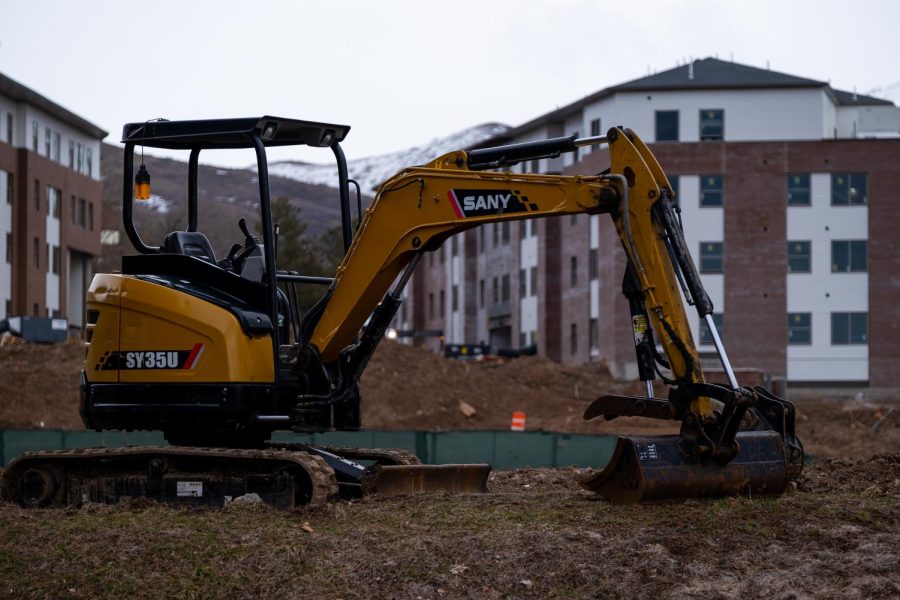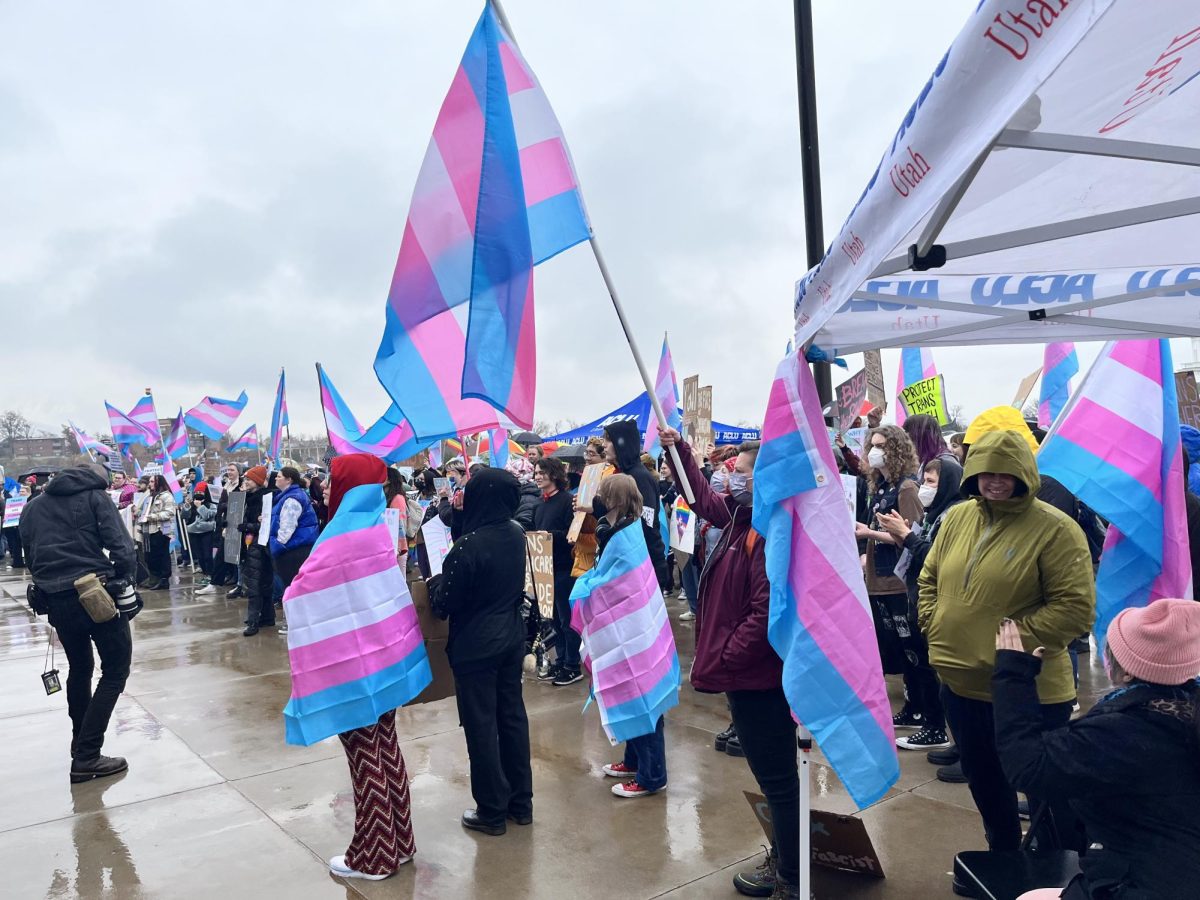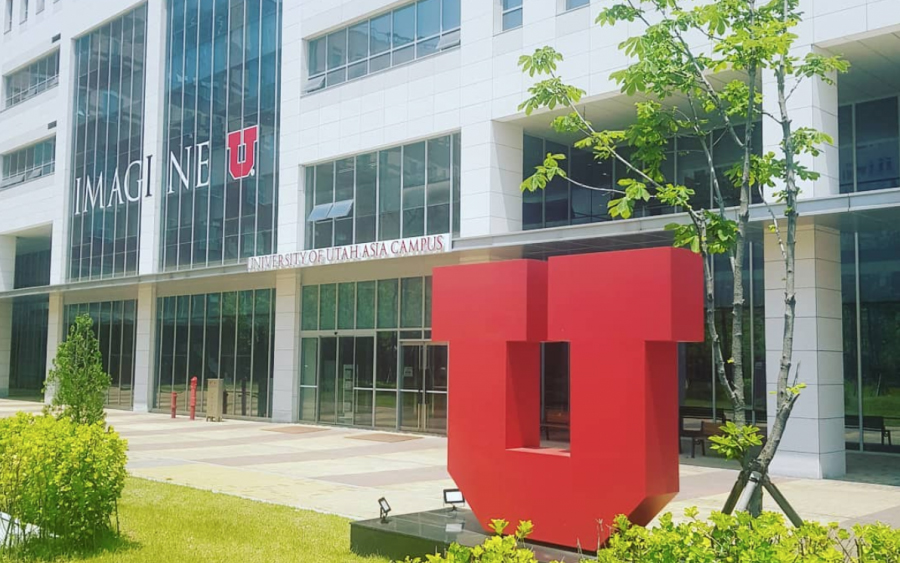Graduate Students Face Housing Challenges Due to Demolitions and Rental Increase
A mini excavator in front of the new West Village housing under construction in Salt Lake City on Wednesday, Mar. 22, 2023. (Photo by Marco Lozzi | The Daily Utah Chronicle)
March 26, 2023
Graduate housing at the University of Utah has housed generations of students and families, but now these students must decide if they want to stay or move somewhere else.
Thousands of students from over 100 different countries attend the U, many with the idea that they will have affordable housing while they complete their degree. This reality has shifted for many graduate students at the U as current graduate housing gets demolished and rebuilt. The proposed rates for the new housing, Sunnyside Apartments, is out of range for many students, costing nearly double of what they currently pay.
Outdated Housing Leads to Demolition
Jen Reed, associate vice president of auxiliary services, was tasked with leading a project to rebuild the U’s family and graduate housing. Reed said that the current housing, which includes the East and West Villages and the Medical Towers, were built in the 1960s and ’70s. Due to their age, the buildings now experience many infrastructure failures.
The importance of this project became more pertinent after Salt Lake City experienced a major earthquake in 2020, raising concerns about whether older buildings would be able to withstand future events. In order to fund the project, Reed said, the U took a $126 million dollar bond from the legislature that needs to be paid back in 30 years.
Paying off this bond means increased rent prices for graduate students.
“The housing that was built in the ’60s and ’70s did not have any debt left on it, so the expenses to operate those properties were lower than the expenses will be at Sunnyside Apartments,” Reed said. “We modeled our rates to be able to make those payments and to cover operating expenses.”
The University Student Apartments, unaffiliated with Housing and Residential Education at the U, are ultimately responsible for the payment of the debt.
Graduate Student Experiences
The U has been able to provide discounted housing to single students living in the Medical Towers that wish to transfer to the Sunnyside Apartments. Currently, this discount is only for single students, which leaves many families that live in the Village unable to afford the new apartments.
Tara Cummins, whose husband is a Ph.D. student studying plant biology at the U, said her family chose the University Apartments because they wanted something close to campus, affordable and family friendly. Families such as hers, which are single income households with multiple children, are unable to afford Sunnyside Apartments and have since considered leaving the U earlier than planned.
Although the community in the Village is something Cummins valued, with the price increase she feels this aspect of graduate student housing may be prone to change in the new apartments.
“We’re not sure if that [community] will even be available for us because the prices of the new buildings are pricing out a lot of families, especially single income families, like us,” Cummins said.
The current rate at the University Apartments has allowed her to stay home and raise her five children. Cummins said that if her family was to transfer to the new apartments, their quality of life would be greatly impacted by the financial burden, as she would be forced to start working and make arrangements for childcare.
The Cummins family has considered their options and the Sunnyside Apartments isn’t a viable one. Instead, she and her husband have considered cutting her husband’s postdoc short to move and find somewhere affordable for their family, despite the possibility that this could cut down on his job opportunities and his pay in the field.
Even if the family was to stay for her husband’s postdoc, Cummins pointed out, they would still have to move away from the school, which would cut into the time the family spends together. For Cummins, this decision is not just about a rent payment, but also the type of life they want for their family.
Ellie Safaeikouchaksaraei is a student completing her Ph.D. in chemical engineering alongside her husband. They each moved to the U.S. from Iran because they received a very good offer from the U and the opportunity to have affordable housing on campus. Safaeikouchaksaraei said this change in housing and finances poses a number of challenges for them.
“First of all, once we applied for this housing, the Medical Towers, and they didn’t tell us that they have a plan to demolish these buildings after a certain year,” Safaeikouchaksaraei said. “Before these, all of these situations, I had no concern about my housing.”
Without this housing, the couple must figure out what is next for them in a market that is unfamiliar to them both.
“We are international students, Safaeikouchaksaraei said. “We don’t have any family here, so we’re not actually familiar with rental rates and how to get the best home outside the university campus. So we trusted the University.”
Ava Anjom and Mehdi Eskandari moved to Utah so Anjom could complete her Ph.D. in educational psychology at the U. She also works at the University Counseling Center as a part of her Ph.D. program. Anjom said that having to move off campus will affect her work, studies and time spent with her family.
The couple felt the notice of demolition was sudden, frustrating and showed a lack of transparency from the university. There has been no clear timespan given to the students for the completion of the project, other than the fact that it is a 10 year project.
“That has been really frustrating,” Anjom said.
The couple feel that the university is prioritizing future students over current students, but they have heard of many graduate students that no longer plan to attend the U because of the problems current students are facing with housing.
“So when the university is kind of thinking about future students … I would ask them, ‘What future students?’” Mehdi Eskandari said.
Communication Between the University and Students
In their frustration, the Eskandaris organized a petition to present to the university that listed residents’ concerns, which amassed nearly 300 signatures. Parts of the petition were picked up for a presentation to the U by the Residential Council, the leadership for University Student Apartments that facilitates contact between the university and resident graduate students. This encouraged solutions to help ease the stress that was brought onto students by housing changes.
Blake Billings, the mayor of the Residential Council, has worked with Reed to find ways to help the students. The Residential Council has made an effort to initiate communication with graduate student residents during this process.
“We’ve talked to a lot of residents, we’ve held open forums, open assemblies with residents to come [to],” Billings said.
Reed has responded to the Residential Council’s concerns with discounts for single students currently living in the Medical Towers and a task force assembled to research graduate stipend changes.
Graduate students continue to assess their options and hope for a solution from the U. Although the affordability of housing was a draw for many graduate students at the U, including Billings, that might be changing.
“I had other offers from other colleges, I came here because I could afford to live here, my family could afford to live here,” Billings said.
aynaelyssya.thomas@dailyutahchronicle.com
This article was updated on March 27, 2023, to clarify an interviewee’s name as Ava Anjom not Ava Eskandari.













